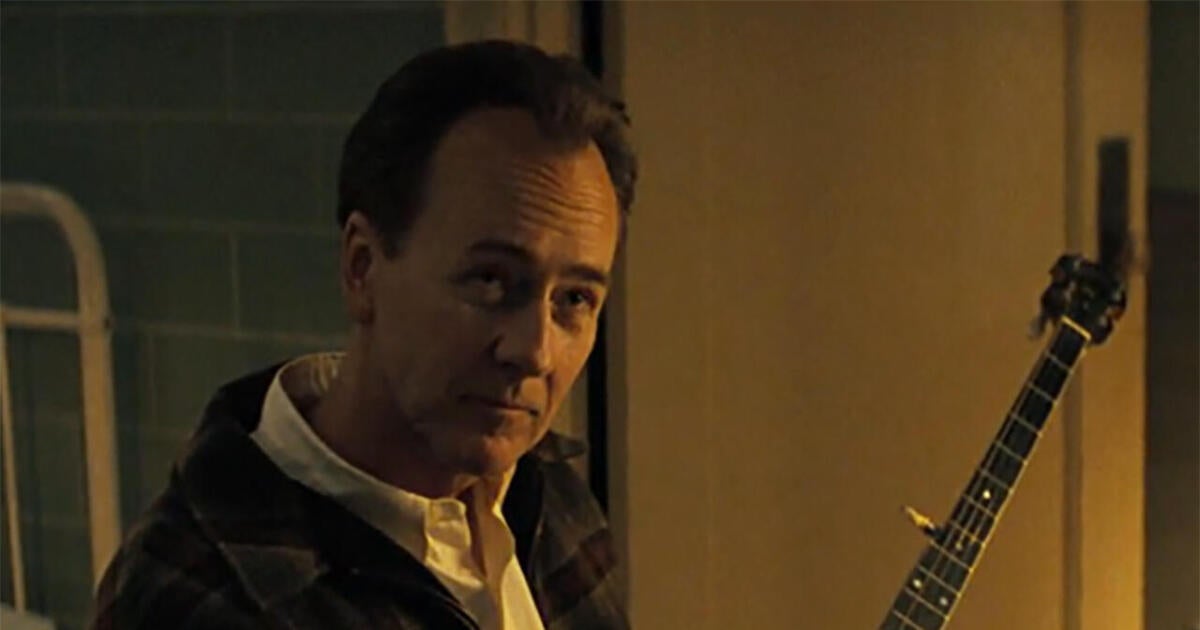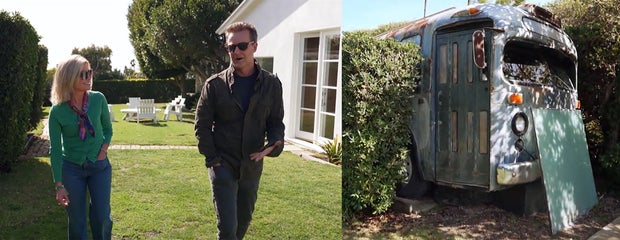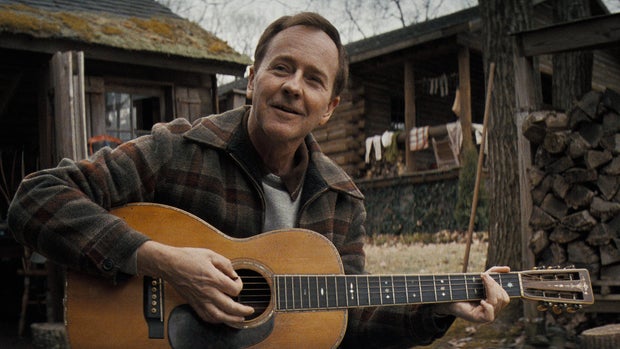The fires that ravaged Southern California last month turned too many of Malibu’s most treasured places to ash. But some, like the legendary Shangri-La Studios, still stand. Over the years, Shangri-La has been used by some of the biggest names in the music business, like Eric Clapton and Adele. But it’s also known as the house that Bob Dylan built. Even the old bus out back, legend has it, was used by Dylan on tour.
Dylan even camped out on the lawn. “I actually think it’s in Clapton’s biography that there was a period where Dylan had a tent in the rose garden here,” said actor Edward Norton.
CBS News
For him, this is hallowed ground – and in a way, so is his latest movie role. In “A Complete Unknown,” Norton is folk music legend Pete Seeger, playing opposite Timothée Chalamet as the young Bob Dylan.
Norton says playing a music legend like Seeger was both sublime, and terrifying. “I think every actor, some part of ’em wants to be a rock star, you know?” he said. “I think every actor holds the dream in some sense. I mean, I almost started crying at the idea of it, because, well, I was nervous about it. I was nervous about the whole enterprise. Because I thought the idea of a biopic about Dylan – if you just said it that way, I was, like, Oooh, like, I’m not sure. ‘Cause to me, it has a mythical kind of place in me, and I thought, this could be really, really a bad idea.”
Searchlight Pictures
And here’s just one of the challenges: Pete Seeger was an accomplished banjo player, so Norton had to become one as well, and the banjo’s a tough one to learn.
I said, “We did an interview with Steve Martin, and he played the banjo for us, and watching him play the banjo, I mean, it’s so complex and it’s so fast.”
“Yeah, I made the joke that I googled, you know, ‘Is there an AI that can replace my hands with Steve Martin’s?'” Norton laughed. “Or, you know, that thing where you put your arms behind your back and Steve Martin puts his hands under my armpits and does the playing for me? Which I’m not saying is not what happened, you know? It might have. Who knows?”
In the finished film, his playing looks and sounds authentic, because it is:
That authenticity is something that Norton has always worked for, starting with his very first movie role, as a calculating killer in the 1996 thriller “Primal Fear.” Norton, who was raised in Maryland, cultivated an Appalachian accent so real that people thought he was actually from Kentucky, and he wound up with his first Oscar nomination. Three years later he was fighting it out with Brad Pitt in “Fight Club,” a film that has now become embedded in our culture.
And although it has a huge following now, it was not successful when it was released. “No, not at all,” Norton said. “And it was polarizing. I would say, there were those who absolutely, like, it hit them right in the center of their sense of their own selves. And then there were people who just absolutely thought it was garbage – panned it.”
In fact, it was roundly booed at the Venice Film Festival. But that didn’t bother Norton, or his co-star Pitt. “As the credits rolled, Brad looked at me in the dark crying, and he said, ‘That’s the best film we’ll ever be in.’ And I said, ‘Me, too, and I think so, too.’ And we were hugging each other and crying because we were so happy with, like, boos rising around us, you know what I mean? I think sometimes you just gotta, you know, let your own freak flag fly, and people will figure it out, or not.”
Norton has let his own freak flag fly in more than 40 films, like a mild-mannered police captain in “The Grand Budapest Hotel.” He was an ego-driven Broadway actor in “Birdman”; and he nailed the eccentric billionaire part in “Glass Onion.”
Watching him on-screen, it’s hard to believe Norton was once told he didn’t have what it takes to make it as an actor. There was once a casting director who told him, “Find another profession.”
“Yeah, I had one of those, like, someone sits you down and says, ‘You should do something else,'” he said. “Very, very, very well-known casting director in New York. One of the ones you hoped to get in front of. But look, if you don’t run into moments where people lay some fundamental uncertainty around you [about] the path you’ve chosen, and you can’t push through it, then you probably don’t belong.”
There’s little doubt he belongs in all of this: Norton has an Oscar nomination for every decade of his career, and he’s in the running now for his work in “A Complete Unknown.” But he says that, for him, it’s not about the awards or the money, but the chance to channel greatness.
He said, “If channeling their frequency gets people refocused on what it looked like when people were using the talents they had to further ideas and values that were bigger than themselves, then that is what makes it worth doing. Can we get people to re-engage with and be moved by and inspired by the idea of artists as agents of change?”
And whether Edward Norton is a pure artist, or just a really great actor, it’s easy to believe him.
WEB EXCLUSIVE: Watch an extended interview with Edward Norton
To watch a trailer for “A Complete Unknown,” click on the video player below:
For more info:
Story produced by John D’Amelio. Editor: Remington Korper.



